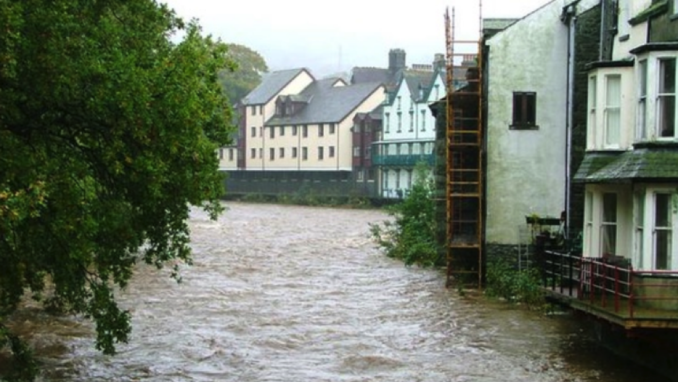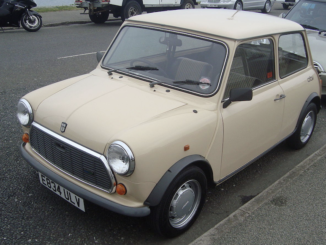
River Greta in full flood,
Mick Garratt – Licence CC BY-SA 2.0
Myself and Davies are two dots in the landscape running along county roads from Sleescale to a neighbouring town. Occasionally, we take short cuts across farmer’s fields. The weather is cold. So cold that the newspapers, amongst stories of violent pickets and wobbling wet Tory toffs, speculate of an approaching Ice Age.
I can keep ahead of him, in bursts, but for most of the time, he sets the pace despite carrying by far the biggest half of our tackle on his back. On excellent money, embedded on behalf of Her Majesty in the northern coalfields to disrupt a strategically significant strike, he’s been on a supermarket sweep in Sleescale’s only sports shop.
Every infantryman wants to be trotting towards a battle with the best equipment, my companion was no different, decked out as he was in the latest endurance clobber. His running shoes cost more than a cheap second-hand car, would likely last longer, and do more miles in greater comfort.
As for myself, I’m a different chap altogether, patched together, improvised. Wearing ordinary trainers, shorts decorated with a football badge (instead of an exclusive brand), I have an old tee shirt that is having its shoulders ripped off by the straps of a cheapo air force blue canvass bag. Inside, the basic bivvy requirements plus a box of sandwiches in tin foil. Also, a pair of binoculars, presently just where I don’t want them to be, killing my back despite being wrapped in a towel. That weekend, fate had made the infantry and the research department into flesh, pushed them together and encouraged them up a hill in the middle of nowhere.
The countryside suddenly surprised us. A long steep climb led not to a splendid view but to a sudden dip. At the bottom of which lay a ford rather than a bridge. Rising again and rounding a corner, we startled deer on the road.
The trend in the contours returned to upwards. As we ran further away from the coast we were leaving behind pasture and beginning to be surrounded by hill farms. Limestone pavement topped mountains waited in the distance between clay coloured rivers swollen by the runoff from abandoned lead and silver workings.
We reached Swaleford, a dot on the map famous for a row of buildings leaning too close to the rapids. An arched bridge was weighed down to the river bank by the presence of a cafe. The time was pork o’clock. Having struck out from our corner shop lodgings under darkness, and having made pleasing progress, Davies announced that we’d, “Earned the pig.”
He pushed the entrance door near off its hinges, ignoring the ‘no packs inside please’ sign.
“You don’t do very well out of this do you, Worth? Appreciate you coming along. Top man. Owe you a favour.”
In the various reflections within the eatery, a pane glass frontage, framed photos of sheep, the spotless counter, even in the lady proprietor’s thick spectacles, I caught myself dishevelled.
“Colder, wetter, more tiring the better. Toughens me up,” he continued, hinting at the prep for his special forces selection.
“With luck, it’ll be many degrees of frost on the tops, with a bit of snow thrown down too. Brecon Beacons will feel like a week off.”
If I wasn’t feeling too glum, the reason was this. The research unit, as well as the bloody infantry, can put a high point to use.
After Swaleford we were well off the beaten path, rising faster than previously, now on footpaths and bridleways. Proper bridleways indented with frozen hoof marks, many of them showing no sign of a shoe or seg, left by wild ponies that the locals swore were descended from horses set loose by the Romans near two millennia previously.
We stopped for a breather. With nothing to lean on, we stood tall in the landscape, together alone. There was no sign of habitation, let alone another human. We’d exhausted our bottles earlier and were relying upon filling them up as nature allowed. The water was now a reddy colour.
“Because of the peat bog,” said Davies.
“Because of the mines,” said I.
Off we set again, one more big push. Having become steeper and steeper, the land became sheer. A final nail tearing scramble took us to the flat mountain top, not so much a pavement of limestone, more like closely packed tank traps with ankle-breaking chasms between them. Without cover and with nothing to make a fire with, we prepared a cold meal from our packs and sat and talked about nothing in particular until we ran out of anything to say.
I emptied my bag revealing a light sleeping bag, a bright yellow plastic bivvy and binoculars wrapped in a towel. Davies prepared a space beside me, furnishing it with his more expensive kit. “Guaranteed to minus thirty,” he boasted of his sleeping bag. Mine looked the type you might line a dog’s basket with. Any fool can be uncomfortable and in this double act I was the idiot.
“While you’re having a dry run for an embassy siege in Iceland, I’m here for the view,” I said, putting the strap of my binoculars around my neck. And what a view it was, with Sleescale in the distance and the coast unwrapping itself in both directions from the town. A cloudless sky promised a cold night after a light early evening. Distance showed pin-sharp.
“Weirdo.” Observed Davies, as I put the eyepieces to my eyes.
“I brought them for for a reason,” I told him.
“Too far away from Miss Cartwright’s bedroom window up here, mate. If you’re desperate to see schoolgirls in their underwear you might be better off going running with a psychiatrist.”
“Miss Cartwright is an important source. All very innocent,” I caught the local gossip from Miss C. Small town talk I could repackage and repeat to break the ice with my insurance claim interviewees. It also made me sound like a local and stopped me from being beaten up by the neighbourhood youth.
“She’s a schoolgirl and it looks terrible,” he warned.
“It doesn’t matter what it looks like. It’s what it is that counts,” I declared.
Davies opposed me diametrically, “It doesn’t matter what it is. What matters is the impression that’s made. The world is changing, mate, image is everything. Did you know, that after the mines are reorganised, more people will work in television than in steel and coal combined?”
I claimed a more useful knowledge.
“I can recite the names of the entire Sleescale football team, and their wives and girlfriends. Gives just the right impression, and saves my life in taxi rank small talk with drunks in the middle of the night on the way back from my late interviews.”
“There you are,” Davies concluded, “image is everything. I was right. The medium is the message. Now find a better medium, one that’s not in a school uniform.”
I was scanning the coastline through the field glasses, slowly, from south to north, and back to south again, before repeating the process.
“While we’re on the subject,” I replied, chancing my arm, “I had a word with the Colonel about what you told me on the train coming down, on our first day. I hope I’m not out of order. I felt I had to pass it by someone, it being serious stuff.”
Davies barked back in his usual tone, no more aggressive than usual, unconcerned that I might have betrayed his confidence,
“Colonel will have heard it all before, common knowledge, establishment types do what they want, chauffeurs and protection officers see the lot. Gets repeated, mess nights, drunk in a corner of a pub wants to sound important or desperate for somebody to talk to. Plod doesn’t want to know, briefs are bent, the beak’s even worse. Journalists want to tell the story, but they get their heads bitten off. Nasty stuff. Avoid. What did the Colonel say?”
“Same as you,” I replied, “in a roundabout non-committal kind of way. I had to read between the lines a bit. He is a crafty old fox.”
“He’s got a lot to lose. Rank. Pension. Wife. Kids. Has to keep his head down. Proves my point. Significant people, that’s how they get away with it.”
“Something’s afoot, Davies,” I reassured him, “I’m on the case. Do you believe in God?”
“No. Yes. Sort of. Sometimes. In a trench under incoming, definitely. Fades as the gunfire does. I’m sure I’m not the only one.”
I told him that there’d been so many coincidences and so much had fallen into place for me simultaneously, that it couldn’t be happenstance. A force for good was moving and I was at the centre, making me well placed to strike a hammer blow against the dark side of the establishment.
“You’re delirious,” he assured me, “because of the cold. You should have brought a hat. Otherwise, you’re being set up for a fall by some influential people. You be careful.”
Still making use of my binoculars, I had spotted what I was looking for. Davies was right. I did need better sources than the likes of Miss Cartwright. One of those better sources, although he didn’t realise it, was lying next to me in his premium-priced, expensive logo, night out in the Arctic running gear.
I took a deep breath and prepared to tell Davies everything.
To be continued…..
The Goodnight Vienna Audio file


